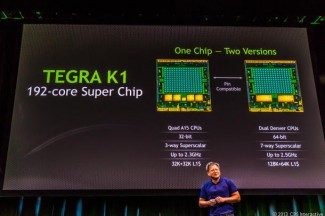In an exclusive interview with Road to VR, Unity CEO, David Helgason outlines to Road to VR’s Jonathan Tustain the potential for Android based virtual reality experiences and warns of a potential new format war.
VR, Mobile OSes and Future Format Wars
Update: It seems this article fell below our usual high standards. As a result, I’ve revisited the article as Editor and corrected errors, assertions and an over zealous headline. Please accept our apologies for the slips, we’l do our best to ensure it doesn’t happen again.
The Unity game development ecosystem is the rendering engine behind many of the Oculus Rift demos currently available, perhaps in part due to every Oculus Rift developer kit being bundled with a four month license to Unity Pro.
But many developer’s eyes are looking towards the Android platform due to its obvious benefits of portability and in November Oculus CEO Brendan Iribe confirmed the company wants to offer Android support in time for the consumer release.

Nvidia are addressing the inferior power of mobile platforms and recently announced the Tegra K1; a chip so powerful nvidia claims it can deliver the same processing power of the Xbox 360 and PS3. Whether this is borne out in real world use oo not is yet to be fully explored, but it seems pretty unlikely the solution will pose a threat to next-gen consoles let alone a dedicated gaming PC. At least right now.
However, Unity already offer an add-on called Android Pro and early demos such as Shadowgun VR provide a glimpse into how graphically rich and responsive a Unity powered Android game can be. Things are certainly moving in the right direction for mobile GPUs.

We recently spoke to Unity CEO David Helgason to find out where the Android operating system fits within their VR roadmap
—
Road to VR: Does do you expect Android Pro to eventually become the main toolset for developing VR experiences?
Helgason: I fully expect VR to become portable, but which operating system gets picked is an open question. Anyone who builds devices in a significantly new form factor has strong reasons to start their own ecosystem rather than relying on an existing one, and that is an argument against relying on Google Play, whether or not the device is running Android or not.
I fully expect VR to become portable, but which operating system gets picked is an open question.
Road to VR: Do you believe VR headset manufacturers will compete, spurring a VR format war?
Helgason: I think that’s quite likely. However that almost certainly won’t matter to game developers who are using Unity, since we have a long track record for support platforms that matter early and well, making it extremely easy to build multiplatform games.
Road to VR: Is virtual reality starting a new bedroom coder revolution?
Helgason: Any new platform provides new opportunities, especially for those willing and able to think about games and other interactive experiences in new ways. The interface for these types of devices and the way players experience virtual worlds can fundamentally change when fully immersed in an environment. There are definitely going to be some opportunities for developers who design ways to make user experiences unique. I think the bigger question is how quickly consumers are going to buy into this new way of playing games. I have no doubt that Oculus is going to be popular among hardcore gamers, especially the PC enthusiast crowd. It’s a bit of a mystery how fast it will pick up with a more mainstream audience that maybe doesn’t see the benefit of spending more hundreds of dollars to experience VR.
There are definitely going to be some opportunities for developers who design ways to make user experiences unique.
Road to VR: Do you expect it to be a while before the Android operating system is powerful enough to deliver compelling VR experiences?
Helgason: Mobile devices are already quite powerful and are increasing their capabilities very quickly. On top of that, good VR experiences don’t necessarily depend on massive computing power. I think it would be a lot of fun to play Minecraft using an Oculus. The bigger question is how likely people are going to want to experience games on mobile devices in the short run. Then again, you see new devices like the Avegant Glyph coming out that are specifically designed for a more mobile VR experience, though on that particular device, the field of vision is less than what the Oculus provides.
Road to VR: What advice could you give to a Unity developer (or someone who wants to start) who wants to successfully develop and sell VR content?
The best advice would be to simply go and experiment, try things out, and see how people react.
Helgason: My advice would be to really think about the device that you’re designing for. Even “obvious” genres like first person shooters will need to be rethought and a lot of trial-and-error will have to happen before gameplay and balance feels right for VR.
The best advice would be to simply go and experiment, try things out, and see how people react.
Road to VR: Are you in discussions to make the plugins available for other VR hardware manufacturers?
Helgason: Unity currently works very well with the Oculus Rift, but over time we expect to support anyone who comes into the market with quality VR sets. We can’t comment on who that might be and when that might happen though.
—
We look forward to finding out what role mobile operating systems have to play in the coming months of Virtual Reality’s rebirth. Whatever happens, Unity has managed to place itself at the core of Indie developer’s efforts to explore this new realm of entertainment. We can’t see that changing any time soon.
Our thanks to David Helgason and to Jonathan Tustain for the interview.








